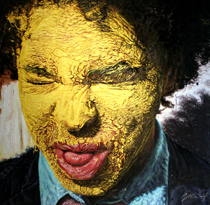Childhood Reminiscences of a House with a Little Room in an Indian Town
Prosenjit Dey Chaudhury
We spent late evenings in a little room that held a table covered with a hard sheet of transparent plastic made usually for plain tables much used. There was another layer below that had floral designs on a somewhat incongruous blue background. The frames of the two windows on the opposite wall were partly open to keep the air flowing. It was not really hot though it could get a little incommodious inside if something was not kept open. You could glimpse the dark shapes of trees and bunched leaves outside. These companions of the day had retreated into their mysterious world and were not to be approached until the break of the next morning.
The town had lapsed into silence. Even the sound of vehicles on the road was deadened by the presence of the big house, from which the little room was removed by a few yards that one traversed across open ground. The blue stars in the sky always gave an idea of chill that was invariably replaced by a sense of the forbidding dark. The nearest wall of the next house permitted chinks of light to escape from inside.
Our house had solid walls from which only the plaster might peel off or sometimes a crush of mortar might tumble without the least warning. In the compound stood another house with a sloping roof of thatch and walls of cane and bamboo. Everything was in repose and we were the only stirring creatures of the night. Inside the little room, with the door closed but still allowing entry of the air outside, there was a mood of expectancy not only about the repast that was in store, but also concerning the stories of the day that could pour forth unexpectedly from a mouth that had till then chosen to remain as impassive as the lips of a mottled stone statue. There was no trace of boredom but there was often prolonged silence. It was as if all had been said and only something startling could now open the ears of the occupants.
We remained seated on the wooden chairs and listened to the silence outside, wondering where the raucous crows of the day had gone. Sometimes we heard the distant hum of an aeroplane. Sometimes voices came across from somewhere. Sometimes we needed reassurance in the comforting sound of words from someone wise in the interpretation of the dark. Everything was just as it should be and yet we were all waiting for a stone to fall in the water and create ripples of pleasant anxiety. There was no one who did not have something to say for oneself. Yet there was no one who did not wait for someone else to begin. We had all contributed our share to the universal noise of the day. We leaped, we frolicked, and we frisked. We shouted, we heard shouting and we wanted to shout. We had seen the sun go down beyond the tall fading yellow buildings. We had listened to the imperative of the commencing night and retreated to our chambers for a few hours of stately silence. The present room was the site of the final rendezvous before the house lights would go out and the shadows of the bicycles on the road would pass across the aged walls of the house.
During the day the bicycles, rickshaws, buses, scooters and flat automobiles would hurry up and down the road. We would either speed along on our feet or wait for the speeds on the road to slacken. The day was often clear; indeed it is difficult to remember a time when it was raining strongly. The fans on the ceiling would turn timidly in their duty. The sun beat down on the smooth, polished floor of the gallery at the back of the big house, pricking every ear of grain that spread in a graceful heap upon curving boards of criss-crossing bark. Suddenly a voice would speak of an invitation to a ceremony two days thence at another large house. A long glistening length of hair would be combed back smoothly and the merits of the invitation discussed. The maids would scurry along the gallery and to the terrace, carrying utensils and tubs of clothes. They were not young maids, having seen their children grow up to marriage and beget children in turn. Countless were the stories of betrayal, sacrifice, penury and despondency those lips poured forth; but they still followed the same rhythm. It was a time when the rest of the world was moving along at a pace you could keep up with. The tolling of the brass bell from the prayer room was an affirmation of the endless cycle of being. We ran from one corner of the house to another and the next corner was endlessly a new corner.




Brilliantly evocative. Reminiscent of The Enigma of Arrival, but the writer has a voice all his own.